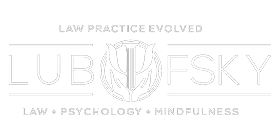The mind seems to incessantly scan the environment for problems to solve. This active intellectual engagement with our environment likely served to ensure our survival as a species over millions of years as immediate physical dangers routinely confronted us in more primitive times.
The mind seeks problems to solve largely within the parameters of cause and effect. Problems arise, however, when the mind latches onto a situation over which the individual lacks causal influence. When facing such situations, one can and usually will become quickly frustrated insofar as he or she is attempting to solve a problem that is largely insoluble in an intellectual, analytical mode.
At times such as this, including times of interpersonal conflict commonly present in legal disputes, a real need arises to move beyond analytical thought and towards a wisdom arising not out of intellectual analysis, but out of a felt connection with all of life in the present moment.
Mindfulness exercises, often including meditation practice, cultivate and strengthen one’s ability to access this wisdom beyond analytical thought.
This is why holistic law practice incorporates mindfulness exercises as a necessary component of successful conflict resolution. Insofar as parties remain locked into an analytical, thought-driven orientation to conflict, they will work – consciously or unconsciously – to reframe the issues in a way that is “intellectually manageable” and solvable largely through the exercise of personal influence.
Often, this is like trying to fit a square peg in a round hole. The frustration resulting from this type of activity over a prolonged time period, in no small part, explains why tension between parties in traditional adversarial litigation tends to escalate over time.
Clients with no prior experience with mindfulness practice or meditation often understand, in theory, the value of a more holistic approach to legal conflict, but wonder how to cultivate a more grounded and less thought-driven approach. Mindfulness exercises incorporated in holistic law practice often begin with guided attention to the breath, body, or other somatic experience. Within a few sessions, and with some daily practice, clients report the arising of a sense of connection to present-moment experience fundamentally different from their previously narrow thought-driven orientation toward experience. It is this constrained orientation that has left them feeling frustrated and perhaps helpless. With some sustained practiceS, clients begin to identify potential solutions to conflict that transcend their constrained self-interest. At this point optimal, transformative solutions to conflict become possible.
To learn more about incorporating mindfulness in law practice, contact Holistic Lawyer and Mediator Michael Lubofsky by visiting http://www.Holistic-Lawyer.com or by calling (415) 508-6263.
